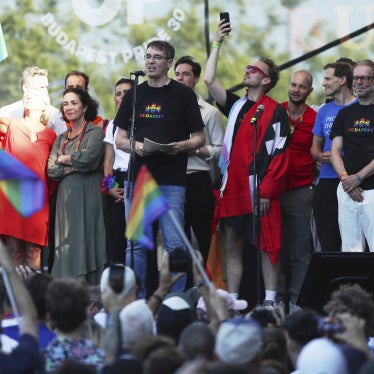On behalf of Human Rights Watch, I write to protest your threat to ban Russia’s first gay pride parade, scheduled to be held in Moscow on May 27, 2006. Prohibiting this parade would constitute an unacceptable and discriminatory interference with the peaceful exercise of the freedom of assembly.
On behalf of Human Rights Watch, I write to protest your threat to ban Russia’s first gay pride parade, scheduled to be held in Moscow on May 27, 2006. Prohibiting this parade would constitute an unacceptable and discriminatory interference with the peaceful exercise of the freedom of assembly.
Your press spokesman Sergey Tsoy told reporters on February 16 that "The Moscow government is not even going to consider allowing a gay parade." Claiming that the proposed event has "evoked outrage in society, in particular among religious leaders," he stated that you were "firm that the city government will not allow a gay parade in any form, open or disguised, and any attempts to organize an unsanctioned action will be resolutely quashed."
The chair of Moscow City Council’s security commission, Inna Svyatenko, has suggested that the parade should be banned because it could “artificially provoke” disorder in response: “Moscow is not Amsterdam, Brussels, Manchester or Tel-Aviv. Are they craving compassion and understanding or a scandal? If they want a scandal, they have succeeded. It is absolutely obvious that the gays will have to meet with an aggressive crowd. The problem is not just with skinheads or other young people’s groups. It is just that the gay-culture in our country is marginal.” She specifically referred to a pride march that was held in Latvia in 2005, which assaulted by violent counterdemonstrators.
Banning the parade would violate Russia’s obligations under international law. As a party to the European Convention on Human Rights and Fundamental Freedoms, Russia is obligated not to discriminate on grounds of sexual orientation or gender identity in relation to any of the rights enjoyed under the Convention—including the freedoms of expression and assembly. The European Court has on several occasions made clear that discrimination based on sexual orientation is strictly prohibited. Most recently in Karner v Austria, the Court pointed out that "very weighty reasons have to be put forward before the Court could regard a difference in treatment based exclusively on the ground of sex as compatible with the Convention. Just like differences based on sex, differences based on sexual orientation require particularly serious reasons by way of justification." Similarly, the U.N. Human Rights Committee—charged with monitoring states’ compliance with the International Covenant on Civil and Political Rights (ICCPR) –held in 1994 in Toonen v Australia that sexual orientation should be understood as a status protected against discrimination by the treaty’s equality provisions.
Banning the parade because of fears of disturbance due to counterdemonstrators would amount to allowing prejudice to stifle free expression simply because its voice may be louder and its imprecations more violent. City authorities and police are responsible for ensuring that people can exercise their freedoms safely. They should restrain counterdemonstrators if they threaten violence, not give them a veto over peaceful assembly.
Gay and lesbian pride parades represent the enjoyment by citizens of their basic rights, which all governmental authorities in the Russian Federation are bound to respect. They also represent an affirmation of pluralism. To restrict basic rights for one group, however unpopular they may be among some parts of the population, opens the gate to restricting them for others. Russia should not move along that route.
We urge you to respect the basic freedoms of Moscow’s lesbian, gay, bisexual, and transgender people: to let this march proceed, and ensure that participants enjoy whatever protection is necessary for the peaceful exercise of their lawful rights.
Sincerely,
Scott Long
Director
Lesbian, Gay, Bisexual, and Transgender Rights Program
Human Rights Watch







